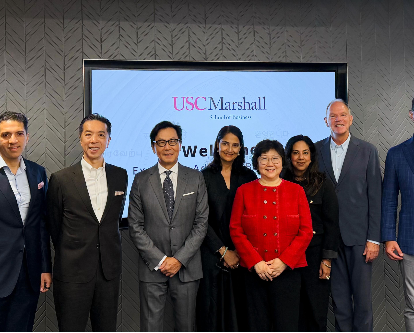
USC Marshall School of Business Launches Asia Executive Advisory Board to Strengthen Global Partnerships
Distinguished leaders gather from across Asia to guide strategic expansion and deepen regional engagement.
Playbook for Career Success: A Q&A with Associate Dean of Career Services Jon Cleveland
Playbook for Career Success: A Q&A with Associate Dean of Career Services Jon Cleveland
Cleveland is innovating the department and leveraging the Trojan Network to get results for students.

USC Marshall’s Career Services is helping Trojans navigate the evolving world of work. Led by Jon Cleveland, the department’s new director and associate dean, the careers team is undergoing significant changes to create more opportunities for Marshall students, from undergraduates to graduates. Through Trojan Network connections, industry partnerships, and an MBA practice group model, Cleveland hopes to empower business school students to new heights, opening the door for exciting professional pathways.
In this Q&A, Cleveland lays out his goals for Marshall Career Services and offers practical advice for students preparing to land that all-important internship or job.
Interviewer: What makes USC especially equipped to help students in their careers?
Jon Cleveland: The biggest feature is the Trojan Network. It’s one of the biggest assets about USC. Truly all institutions are going to say that their alumni help each other, but in my experience, USC does it better than any other institution. Trojans are everywhere and they love to help each other. It’s part of the culture of being a Trojan.
The second feature is the curriculum at USC, specifically in Marshall School of Business. It’s a curriculum that really embraces the future and technology centered in Marshall. We’re thinking not only about integrating AI into all of our classes, but also thinking about how to center human leadership in our students’ experiences. At Marshall, you have an academic experience that’s the blend of technology, human-centered skills, and leadership.
How is the Career Services team preparing students for that professional journey?
JC: We’re in one of the toughest economies in recent history. There was a time when graduating from USC may have almost guaranteed you a job at graduation. That’s no longer the case. And that’s true for all the top institutions. Times are just different.
Right now, students are still positioned for success graduating from USC, and that comes in partnership with Career Services. It takes hard work, time, networking, and intentionality.
The Marshall Career Services team has the playbook, and the more students can engage with Career Services, the better. My team is making sure students have the skills, the polish, and the opportunities necessary for professional success.
How is Career Services evolving?
JC: We’re undergoing a ton of changes in Career Services, including a new organizational structure, new strategic values, new goals and new ways of working, all of which are aimed at better supporting students and rallying our team around a new model of Career Services that’ll lead Marshall into the future and position all students for even better professional success.
We’re incredibly excited about our new full-time MBA Career Services model, which is centered around practice groups. A practice group, led by a practice group leader, is a community of people and resources, alumni, employers, peer advisors, student clubs, case competitions, all of which drive professional success of our MBA students.
Another example is our undergraduate career team and the specialty master’s programs. The speciality master’s career teams were previously under two separate reporting lines and didn’t work together. They’re now working much more closely together as a joint team under Marshall Career Services, which includes shared employer relations support. That’s going to generate many more professional opportunities for all of our students, especially our specialty master’s students.
How can students make the most of what Career Services offers?
JC: It’s not necessarily the most exciting answer, but they have to walk into the office. The first thing is for students to use the services. Despite all the great things I’m sharing, believe it or not, there are still students that choose not to use Career Services on their own.
The other one, I would say: Start early and often. Don’t wait until senior year to come into the career center or meet with a Career Services advisor. It’s easy to put off Career Services thinking, “I’ll deal with that later. I’ll worry about that later.” Start early and start often. Establish that relationship early.
I’m not a proponent of putting all your eggs in one basket, but if I had to pick a basket to put all my eggs in, I would say internships. The team’s always talking about the importance of doing an internship, particularly at the undergraduate level. Students that do an internship are more likely to have a job when they graduate and they’re more likely to have a higher starting salary. It’s a great way to learn what you like, what you don’t like, and to have meaningful experiences to put on your resume. Internships are a really great way to set yourself up for professional success. And again, my team members are ready to help talk to a student at any point about how to secure one, how to start scoping out options, and how to make one happen. Some of the most competitive jobs expect students to come to the table with internship experience.
What’s the best advice you can give students who are seeking internships as an undergraduate or while pursuing their MBA or master’s degree?
JC: My advice is network, network, network. All of us at Career Services help students be prepared for networking opportunities by being polished. We make sure that students have great resumes and are well prepared for the interviews.
Professional success also comes from seizing opportunities too, which Career Services teams can’t necessarily control. You’ve got to be ready for the opportunities when they present themselves and you create the chance to be ready for more opportunities by networking. The more you network, the more chances for opportunities.
The best time to network is not when you’re in desperate need of a job. The best time to network is when you have the luxury of time on your hands and when you’re just out there having great conversations and seeing where those connections might lead.
How have you seen the Trojan Network in action?
JC: The Trojan Network is huge to us — alumni are awesome. We have alumni who connect with students all the time, provide mentorship and advice, who come and serve as clinic panelists on our workshops and lead workshops.
The Trojan Network and the alumni who are willing to give back are really critical to our services and critical to providing professional advice and a good foundation of professional success to our students.
The Trojan Network showcases the future of Career Services. We always say Career Services is about relationships, not resumes. As career technology and AI gets better, resumes can’t be my team’s value proposition because we won’t need people to create resumes, if they even still exist in the future. Our value proposition cannot be the career tools; technology will take care of that.
The future of Career Services will be about connecting people to opportunities, building relationships, networking, connecting people to value, finding the right organizational fit, and making strategic connections. It’ll be about better facilitating connections through the Trojan Network.
What’re your future goals for Marshall Career Services?
JC: We just announced four strategic values that’ll guide us for at least the next five years: relationship-centered, career outcome-driven, innovative practice, and team-centered.
Relationship-centered: As career tools get better, we get better at making connections between people and the organizations.
Career outcome driven: We recognize people pursue our degrees for jobs. Our drive is to connect people to as many professional opportunities as possible.
Innovative practice: Our work is tech-centered, future focused, and willing to change.
Team-centered: We value our people, we work hard, we have fun, and we’re authentic and the best place to work on campus.
Those are the long-term values that I’m trying to lead the team towards to build the organization that we want to be over the next five years. In these next six to eight months, we are trying to have as many employers present as possible. All the teams are working to collect data on how many employers were present on campus last year, and then we are trying to beat those numbers by a lot.
We have a great committed group of team members who are rallying around student success. They are excited about the new model and excited about serving students well.
RELATED
USC Marshall School of Business Launches Asia Executive Advisory Board to Strengthen Global Partnerships
Distinguished leaders gather from across Asia to guide strategic expansion and deepen regional engagement.
Dean’s Dialogue: SpaceX CFO Bret Johnsen on Space Innovation and the Trojan Network
Bret Johnsen, a Leventhal alumnus, spoke with Marshall Dean Geoffrey Garrett about SpaceX’s cutting-edge projects, U.S. manufacturing, and the value of a USC education.
Marine Rediscovers Connection and Confidence through Master of Business for Veterans Program
In the Trojan Network of veterans, Thomas Vriens MBV ’21, a director at GHP Management, found a lasting community that helped him thrive after service.
MBV Education Helps Veteran Transition From Military into Defense Career at Anduril
With the backing of his degree and the support of the Trojan Network, Randall Parkes MBV ’21 seized an opportunity in cutting-edge defense technology.
Marshall Faculty Publications, Awards, and Honors: October 2025
We are proud to highlight the many accomplishments of Marshall’s exceptional faculty recognized for recently accepted and published research and achievements in their field.